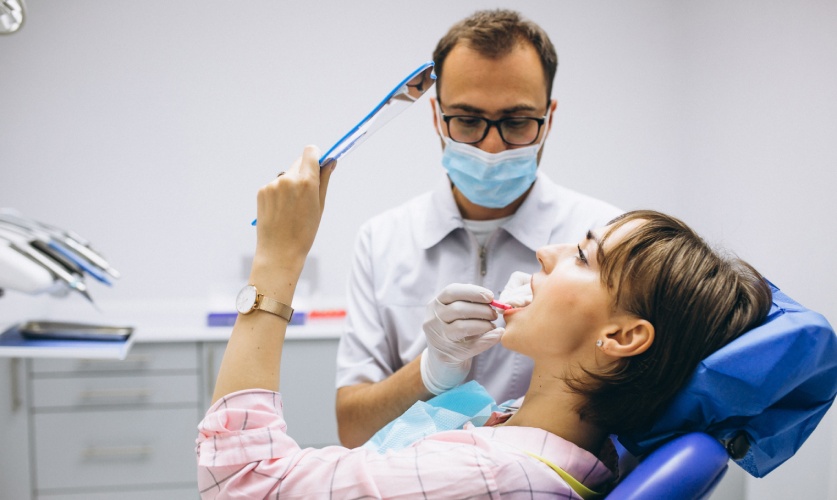
At Astha Multi Speciality Dental Clinic – Palanpur Dental, we recognize the serious complications that can arise due to poor sterilization practices. That’s why infection control is one of the most critical aspects of our dental care system.
Our dentists, visiting dental surgeons, nursing staff, administrative team, and support staff are all thoroughly trained in strict, world-class hygiene and sterilization protocols designed to safeguard every patient.
Who could understand infection control better than an Oral & Maxillofacial Surgeon and a Periodontist, both highly qualified postgraduates in surgical specialties? With Dr. Motilal Agrawal and Dr. Chintan Agrawal at the helm, we maintain surgical-grade cleanliness standards throughout the clinic.
Working Space Hygiene
Every day begins with a complete floor disinfection using Bacillocid Special, a hospital-grade concentrate that leaves the entire clinic germ-free and fresh-smelling.
Between every patient, dental chairs and contact surfaces are disinfected with Bacillol 25, a proven surface and equipment disinfectant. This step is repeated after every procedure to prevent cross-contamination and ensure a safe working space for both patients and our team.
Use of Disposables
We follow a strict single-use policy for the following:
Biomedical Waste Disposal
We are affiliated with SembRamky Environmental Management Pvt. Ltd., a licensed biomedical waste management provider. This ensures safe, legal, and eco-friendly disposal of all medical and hazardous waste, leaving no room for infection risk or environmental harm.
Instrument Sterilization Protocol
For all non-disposable dental instruments, we follow a rigorous 4-step sterilization process, which matches the highest standards observed at top-quality healthcare institutions around the world:
At Astha Multi Speciality Dental Clinic – Palanpur Dental, your safety is our priority. Our sterilization and hygiene practices are not just procedures—they are part of our commitment to excellence, trust, and responsibility. Whether you’re visiting us from Palanpur, another part of India, or overseas, you can be assured that your treatment will be carried out in an environment that is safe, hygienic, and medically compliant.
All instruments are thoroughly scrubbed by trained staff to remove any visible debris and biological contaminants. Post-scrubbing, they are washed in a medical-grade antiseptic solution to begin the sterilization process.
After initial cleaning, instruments are placed in an ultrasonic cleaner for deep and effective cleansing. Once cleaned, each instrument is carefully packed into sterile pouches and vacuum sealed to avoid contamination prior to autoclaving.
Autoclaving remains the gold standard in medical sterilization, and we perform it using our advanced, front-loading digital autoclave machine.
Once sterilized, all pouches are stored in a U.V. formalin chamber to preserve their sterility until they are used.
To further ensure a bacteria-free treatment environment, we conduct a comprehensive clinic-wide fumigation every week. This fumigation process uses certified chemical fumes to sterilize the entire clinic space—including treatment areas, waiting rooms, and common surfaces.